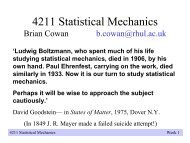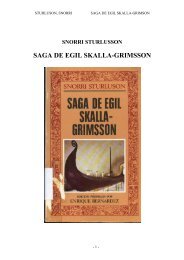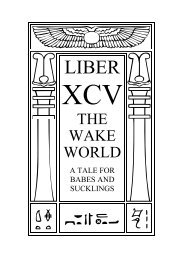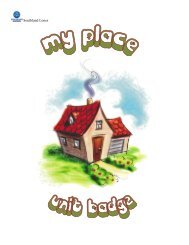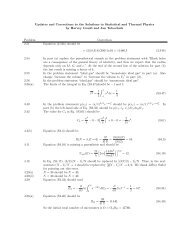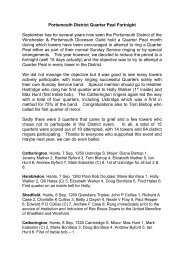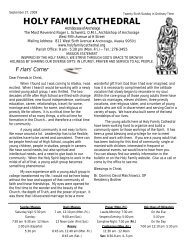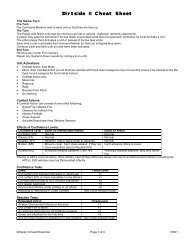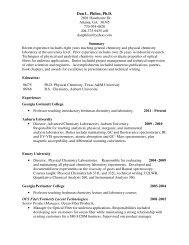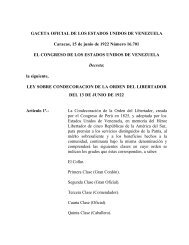A Critique of The German Ideology
A Critique of The German Ideology
A Critique of The German Ideology
Create successful ePaper yourself
Turn your PDF publications into a flip-book with our unique Google optimized e-Paper software.
suspended, the rural and urban population had decreased. From these conditions and the<br />
mode <strong>of</strong> organisation <strong>of</strong> the conquest determined by them, feudal property developed<br />
under the influence <strong>of</strong> the <strong>German</strong>ic military constitution. Like tribal and communal<br />
ownership, it is based again on a community; but the directly producing class standing<br />
over against it is not, as in the case <strong>of</strong> the ancient community, the slaves, but the enserfed<br />
small peasantry. As soon as feudalism is fully developed, there also arises antagonism to<br />
the towns. <strong>The</strong> hierarchical structure <strong>of</strong> land ownership, and the armed bodies <strong>of</strong> retainers<br />
associated with it, gave the nobility power over the serfs. This feudal organisation was,<br />
just as much as the ancient communal ownership, an association against a subjected<br />
producing class; but the form <strong>of</strong> association and the relation to the direct producers were<br />
different because <strong>of</strong> the different conditions <strong>of</strong> production.<br />
This feudal system <strong>of</strong> land ownership had its counterpart in the towns in the shape <strong>of</strong><br />
corporative property, the feudal organisation <strong>of</strong> trades. Here property consisted chiefly in<br />
the labour <strong>of</strong> each individual person. <strong>The</strong> necessity for association against the organised<br />
robber-nobility, the need for communal covered markets in an age when the industrialist<br />
was at the same time a merchant, the growing competition <strong>of</strong> the escaped serfs swarming<br />
into the rising towns, the feudal structure <strong>of</strong> the whole country: these combined to bring<br />
about the guilds. <strong>The</strong> gradually accumulated small capital <strong>of</strong> individual craftsmen and<br />
their stable numbers, as against the growing population, evolved the relation <strong>of</strong><br />
journeyman and apprentice, which brought into being in the towns a hierarchy similar to<br />
that in the country.<br />
Thus the chief form <strong>of</strong> property during the feudal epoch consisted on the one hand <strong>of</strong><br />
landed property with serf labour chained to it, and on the other <strong>of</strong> the labour <strong>of</strong> the<br />
individual with small capital commanding the labour <strong>of</strong> journeymen. <strong>The</strong> organisation <strong>of</strong><br />
both was determined by the restricted conditions <strong>of</strong> production -- the small-scale and<br />
primitive cultivation <strong>of</strong> the land, and the craft type <strong>of</strong> industry. <strong>The</strong>re was little division<br />
<strong>of</strong> labour in the heyday <strong>of</strong> feudalism. Each country bore in itself the antithesis <strong>of</strong> town<br />
and country; the division into estates was certainly strongly marked; but apart from the<br />
differentiation <strong>of</strong> princes, nobility, clergy and peasants in the country, and masters,<br />
journeymen, apprentices and soon also the rabble <strong>of</strong> casual labourers in the towns, no<br />
division <strong>of</strong> importance took place. In agriculture it was rendered difficult by the<br />
strip-system, beside which the cottage industry <strong>of</strong> the peasants themselves emerged. In<br />
industry there was no division <strong>of</strong> labour at all in the individual trades themselves, and<br />
very little between them. <strong>The</strong> separation <strong>of</strong> industry and commerce was found already in<br />
existence in older towns; in the newer it only developed later, when the towns entered<br />
into mutual relations.<br />
<strong>The</strong> grouping <strong>of</strong> larger territories into feudal kingdoms was a necessity for the landed<br />
nobility as for the towns. <strong>The</strong> organisation <strong>of</strong> the ruling class, the nobility, had, therefore,<br />
everywhere a monarch at its head.<br />
<strong>The</strong> fact is, therefore, that definite individuals who are productively active in a definite



